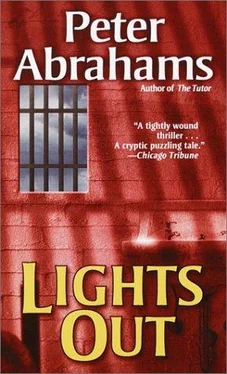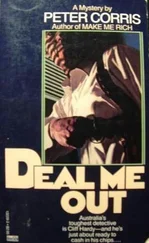Peter Abrahams - Lights Out
Здесь есть возможность читать онлайн «Peter Abrahams - Lights Out» весь текст электронной книги совершенно бесплатно (целиком полную версию без сокращений). В некоторых случаях можно слушать аудио, скачать через торрент в формате fb2 и присутствует краткое содержание. Год выпуска: 2002, ISBN: 2002, Издательство: Fawcett Books, Жанр: Триллер, на английском языке. Описание произведения, (предисловие) а так же отзывы посетителей доступны на портале библиотеки ЛибКат.
- Название:Lights Out
- Автор:
- Издательство:Fawcett Books
- Жанр:
- Год:2002
- ISBN:978-0345445780
- Рейтинг книги:4 / 5. Голосов: 1
-
Избранное:Добавить в избранное
- Отзывы:
-
Ваша оценка:
- 80
- 1
- 2
- 3
- 4
- 5
Lights Out: краткое содержание, описание и аннотация
Предлагаем к чтению аннотацию, описание, краткое содержание или предисловие (зависит от того, что написал сам автор книги «Lights Out»). Если вы не нашли необходимую информацию о книге — напишите в комментариях, мы постараемся отыскать её.
Lights Out — читать онлайн бесплатно полную книгу (весь текст) целиком
Ниже представлен текст книги, разбитый по страницам. Система сохранения места последней прочитанной страницы, позволяет с удобством читать онлайн бесплатно книгу «Lights Out», без необходимости каждый раз заново искать на чём Вы остановились. Поставьте закладку, и сможете в любой момент перейти на страницу, на которой закончили чтение.
Интервал:
Закладка:
The pool was round, with irregular edges that might have been found in nature, and muddy banks. The trickling sound came from a fountain in the shape of a silver breast that hung over the other side. Eddie walked around the pool, stuck his finger into the flow and tasted the water. Unlike the date palm, the water was real; cold and metallic, but drinkable. Eddie lowered his head and drank.
And felt a little better almost at once. He stripped off the sweats. Two or three cigarette butts floated in the pool, but it smelled clean. Eddie lowered himself in. The water came almost to his waist, just deep enough. He pushed off and began a slow lazy crawl.
The movement and the coldness of the water got his blood going. The fog of alcohol lifted from his mind, and the headache soon went with it. Eddie swam back and forth across the pool until he grew tired of making all the turns. Then he climbed out, dried himself with a cloth napkin from one of the tables, dressed. Time to go. He walked over the dune and onto the flat stretch of sand that led to the studded leather door.
It was locked. Locked from the inside, like a cell.
Eddie went back across the sand, past the pool, into the casbah. He entered a bar called Le Chameau Insolite. It had whitewashed walls, Persian rugs, plush divans, mosaic tiles. Behind the bar was a swinging door on which hung a calendar where the year was 1372. Eddie pushed through it, into a stainless-steel kitchen of his own era and civilization.
A man in coveralls was piling green-plastic garbage bags on a trolley. He saw Eddie and said: “Are you the new guy?”
“No.”
“Then where the fuck is he?” The man waved his hand through the air, accidently striking the trolley. The bags slid off and tumbled on the floor.
“That’s all I fuckin’ needed,” the man said, giving the nearest bag a murderous kick with his work boot. Lobster tails and champagne bottles sagged through the hole he made. The phone on the wall started ringing. He snatched at it, barked, “What is it?” listened for a few seconds, cried out, “That’s what he always says,” and banged down the phone. He glanced down at the garbage bags, stopped himself from kicking them again, turned to Eddie.
“Wanna make a quick twenty bucks, buddy? Or thirty?”
“Doing what?”
“My job. I’ve got to do some other asshole’s.”
The job: bagging the night’s garbage, piling it on the trolley, wheeling the trolley out the kitchen, down a long hall, into a freight elevator, up to a loading bay, out to a gray-dawn street. It took three trips. When Eddie returned from the last one, the man, now dressed in a tuxedo, was on the phone again.
“All done,” Eddie told him.
Without looking at him, the man offered a twenty.
“What happened to thirty?” Eddie said.
“Jesus,” said the man. “No, not you, him,” he said into the phone, adding a five. “Everybody wants everything,” he said. He raised his voice. “Not you, I said. Him. Him. Him.”
Eddie took the bills, zipped them into his back pocket next to the hundred, and left, out through the loading bay. “Out there you got to earn it,” Dr. Messer, Director of Treatment, had warned. He was making it hand over fist.
A cold wind was snapping at the tops of the garbage bags and blowing scraps down the street. This wasn’t the same street where Sookray had double-parked the night before, but a narrower, meaner one, lined with soot-covered buildings. Eddie raised the hood on his sweatshirt, tied it tight, and walked off with the wind at his back.
After a few blocks he came to a used bookstore. It had a faded sign, a dusty window, and a bin of twenty-five-cent paperbacks outside. Eddie paused and went through them. Westerns, science fiction, horror: all faded and yellowed, as though the paper were in the process of recycling itself. At the back of the bin, behind a copy of We the Savage Reapers , he came to a slim volume with a red-and-black cover. Monarch Notes: “The Rime of the Ancient Mariner.”
Eddie took it inside.
A bell tinkled as he went in. The store was dark and narrow, lined with books from floor to ceiling. A boy stood on a stepladder at the back. Half-a-dozen books lay on the top step, waiting to be shelved, but the boy, balanced on the ladder, had his nose deep in another one: The Codebreakers . He didn’t seem to have heard the bell.
The floor creaked under Eddie’s feet. The boy heard that and looked up from his book. The sight of Eddie made his eyes widen; afraid simply of his size and appearance.
Eddie held up the book. “I’d like to buy this,” he said, trying to make his voice sound gentle.
The boy climbed down off the ladder. He was short and thin, almost scrawny, and wore a skullcap.
“Twenty-five cents,” he said.
Eddie gave him the five-dollar bill. The boy went to the desk at the front of the store, opened a drawer, and got change. He handed it to Eddie. Perhaps the fact that Eddie had turned out to be a customer rather than a hold-up man gave him the courage to say, “We’ve got the genuine article for a dollar, if you want it.”
“The genuine article?”
“The poem. ‘The Rime of the Ancient Mariner.’ Paperback, but in good condition. What you’ve got there is just a crib.”
“I know the poem already.”
The boy blinked. “You know it?”
Eddie recited the first thirteen stanzas. For a few lines he was hesitant; then the story took over, using his voice but passing through him without any act of his own will. All fear, and even some of the shyness, left the boy’s eyes. Eddie stopped after
And ice, mast-high, came floating by,
As green as emerald.
Not that it seemed a good place to stop. But it reminded Eddie of the ice on the river in his hometown, and broke the flow of the poetry through him.
“So what do you want the Monarch for?” the boy asked. His voice cracked.
“I’ve got some questions.”
“Like?”
Like. Eddie recalled his unsuccessful discussion with Ram Pontoppidan, but he tried again. “Like why he shoots the albatross in the first place.”
The boy didn’t laugh at him. Instead he looked worried. “You won’t find the answer to questions like that in the Monarch.”
“Why not?”
“Because they just want to make sure you pass the test.”
“So?”
“Questions like that aren’t on the test.”
“What kind of questions are on the test?”
“Show how Coleridge uses repetition in ‘The Rime of the Ancient Mariner’ to reinforce theme. That kind of thing.”
Eddie knew he could think of many examples of repetition in “The Mariner”-“Day after day, day after day / We stuck, nor breath nor motion / As idle as a painted ship / Upon a painted ocean”-came to mind right away-but he didn’t know what the theme was, wasn’t even sure of the definition of theme. It was quiet in the bookstore; the books might have been silent living things, like plants.
The boy spoke: “It’s about penance and redemption, right? I mean, he’s not exactly subtle about it.”
“Who isn’t?”
The boy looked surprised. “Coleridge.”
Another pause. Eddie had given a lot of thought to the Mariner’s motives, but none to the poet’s. He said: “Penance for killing the albatross?”
“Yes. But it didn’t have to be an albatross, or killing at all, for that matter. It could be anything. The albatross is just a device, the MacGuffin.”
“The MacGuffin?”
“Like in Psycho -the fact that the motel guy was abused by his mother or whatever it was. The secret that gets the plot going; useful, but not the reason you keep watching.”
“Killing the albatross is just a device?”
Читать дальшеИнтервал:
Закладка:
Похожие книги на «Lights Out»
Представляем Вашему вниманию похожие книги на «Lights Out» списком для выбора. Мы отобрали схожую по названию и смыслу литературу в надежде предоставить читателям больше вариантов отыскать новые, интересные, ещё непрочитанные произведения.
Обсуждение, отзывы о книге «Lights Out» и просто собственные мнения читателей. Оставьте ваши комментарии, напишите, что Вы думаете о произведении, его смысле или главных героях. Укажите что конкретно понравилось, а что нет, и почему Вы так считаете.












